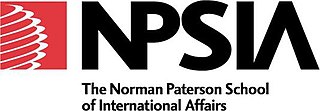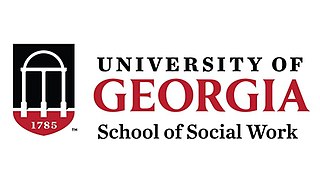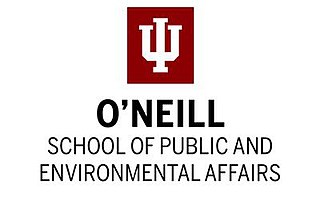
Carleton University is an English-language public research university in Ottawa, Ontario, Canada. Founded in 1942 as Carleton College, the institution originally operated as a private, non-denominational evening college to serve returning World War II veterans. Carleton was chartered as a university by the provincial government in 1952 through The Carleton University Act, which was then amended in 1957, giving the institution its current name. The university is named after the now-dissolved Carleton County, which included the city of Ottawa at the time the university was founded.

The University of Akureyri was founded in 1987 in the town of Akureyri in the northeastern part of Iceland. It is today a school of health sciences, humanities and social science, and a school of business and science. Over 2000 students attended the university in the autumn semester of 2014, around half of them through flexible learning, making the university the largest provider of distance education in the country. The University of Akureyri coordinates with other Icelandic Universities to operate the University Centre of the Westfjords located in Ísafjörður, which operates two master's degrees, one in Coastal and Marine Management and the other in Marine Innovation. Additionally, The University of Akureyri coordinates with other Nordic Universities for the West Nordic Studies and Polar Law Masters programs.
The Master of Public Policy (MPP) is one of several public policy degrees. An MPP is a master's-level professional degree that provides training in policy analysis and program evaluation at public policy schools. The MPP program places a focus on the systematic analysis of issues related to public policy and the decision processes associated with them. This includes training in the role of economic and political factors in public decision-making and policy formulation; microeconomic analysis of policy options and issues; resource allocation and decision modeling; cost/benefit analysis; statistical methods; and various applications to specific public policy topics. MPP recipients serve or have served in the public sector, at the international, national, subnational, and local levels and the private sector.

Algonquin College of Applied Arts and Technology is a publicly funded English-language college located in Ottawa, Ontario, Canada. The college has three campuses, all in Ontario: a primary campus located in Ottawa, and secondary campuses located in Perth and Pembroke. It offers bachelor's degrees, diplomas, and certificates in a range of disciplines and specialties. The college serves the National Capital Region and the outlying areas of Eastern Ontario, Western Quebec, and Upstate New York. It has been ranked among the Top 50 Research Colleges in Canada and has been recognized as one of Canada's top innovation leaders. The enabling legislation is the Ministry of Training, Colleges and Universities Act. It is a member of Polytechnics Canada.

The Norman Paterson School of International Affairs is a professional school of international affairs at Carleton University that was founded in 1965. The school is based at Richcraft Hall on Carleton's campus in Ottawa, Ontario, Canada. Students, alumni and faculty of NPSIA are referred to as 'NPSIAns'.
Arizona State University Downtown Phoenix campus is a public research university in Phoenix, Arizona. It is one of five campuses of Arizona State University.

The Ford School of Public Policy is the public policy school of the University of Michigan in Ann Arbor, Michigan. It was founded in 1914 to train public administration experts. In 1999, the school was named after University of Michigan alumnus and the 38th president of the United States Gerald Ford.

A public policy school or school of public affairs is typically a university program, institution, or professional school of public policy, public administration, political science, international relations, security studies, management, urban planning, urban studies, intelligence studies, global studies, emergency management, public affairs, nonprofit management, criminology, and the sociology of law.

The University of Georgia School of Social Work (SSW) is a college within the University of Georgia (UGA) in Athens, Georgia, United States.
The Watts College of Public Service & Community Solutions is one of the 24 independent school units of Arizona State University. It is located at ASU's Downtown Phoenix Campus in Arizona. Founded in 1979, the college awards bachelors, masters, and doctoral degrees and is organized into four schools and 17 research centers. The programs are divided amongst the School of Social Work, the School of Criminology and Criminal Justice, the School of Public Affairs and the School of Community Resources and Development.

The Arthur Kroeger College of Public Affairs, colloquially known as Arthur Kroeger College or AKC, is a specialized institute within the Faculty of Public Affairs at Carleton University in Ottawa, Ontario. The College offers undergraduate and graduate programs in the fields of public policy, international studies, and political management. These include the Bachelor of Public Affairs and Policy Management (BPAPM), the Bachelor of Global and International Studies (BGInS), the Master of Political Management (MPM), and the MA in Migration and Diaspora Studies (MDS).
The Graduate School of Public and International Affairs (GSPIA) is one of 17 schools comprising the University of Pittsburgh. Founded in 1957 to study national and international public administration, GSPIA prides itself on its "Local to Global" distinction. As of 2018, it is one of only two policy schools with programs in the top 20 for both International Relations and City Management and Urban Policy. The former mayor of Pittsburgh, Bill Peduto, is a GSPIA alumnus.

The John Glenn College of Public Affairs is a public policy and management school at Ohio State University. The Glenn College offers undergraduate, graduate and doctoral programs in public affairs. The Glenn College provides research, training and technical assistance to state, public and nonprofit organizations. The college is named after United States Senator and astronaut John Glenn. On January 30, 2015, the Ohio State University Board of Trustees approved a change of status of the former John Glenn School of Public Affairs making the new John Glenn College of Public Affairs the 15th college at The Ohio State University.
Arts administration is a field in the arts sector that facilitates programming within cultural organizations. Arts administrators are responsible for facilitating the day-to-day operations of the organization as well as the long term goals by and fulfilling its vision, mission and mandate. Arts management became present in the arts and culture sector in the 1960s. Organizations include professional non-profit entities. For examples theaters, museums, symphony orchestras, concert bands, jazz organizations, opera houses, ballet companies and many smaller professional and non-professional for-profit arts-related organizations. The duties of an arts administrator can include staff management, marketing, budget management, public relations, fundraising, program development evaluation, community engagement, strategic planning, and board relations.

The Paul H.O'Neill School of Public and Environmental Affairs is the public policy and environmental studies school of Indiana University with locations on both the Bloomington and Indianapolis campuses. It is the largest and highest-ranked public policy and environmental studies school of its kind in the United States. Founded in 1972, as the Indiana University School of Public and Environmental Affairs, it was the first school to combine public management, policy, and administration with the environmental sciences. O'Neill School Bloomington is the top ranked school of public affairs in the United States. The school received a facelift and expansion when the Paul O'Neill Graduate Center opened for classes in the Spring 2017 semester due to the growing influx of students. In 2019, the name was changed to the O'Neill School of Public and Environmental Affairs in honor of alumnus Paul H. O'Neill who served as the United States Secretary of the Treasury in 2001–2002.
Nonprofit studies or nonprofit management is a multidisciplinary field of teaching and research that focuses on practices of the nonprofit sector and can date back to the 1920s. This area of inquiry examines the management and effectiveness of the nonprofit sector.

The RGK Center for Philanthropy and Community Service is a research center at University of Texas at Austin located in the Lyndon B. Johnson School of Public Affairs. The teaching and research of the RGK Center are focused in the areas of nonprofit organizations, philanthropy, social entrepreneurship, and volunteerism.

The Bush School of Government & Public Service is an academic college of Texas A&M University founded in 1997 under former President George H. W. Bush's philosophy that "public service is a noble calling." Since then, the Bush School has continued to reflect that notion in curriculum, research, and student experience and has become a leading international affairs, political science, and public affairs institution.

The Levin College of Public Affairs and Education (Levin) is an accredited college that houses the Maxine Goodman Levin School of Urban Affairs, School of Communication, as well as, the Department of Counseling, Administration, Supervision and Adult Learning, the Department of Criminology and Sociology, the Department of Educational Studies, Research and Technology, and the Department of Teacher Education. Levin is a part of Cleveland State University located in Cleveland, Ohio. The Levin College offers undergraduate, graduate, and doctoral degrees, as well as professional development programs. Its urban policy research centers and programs provide communities with decision-making tools to address their policy challenges. The Levin College is recognized for offering highly ranked programs in urban policy, local government management, nonprofit management, and public management and leadership.













